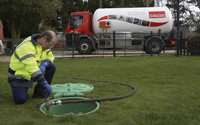

Paul Madge advises heating engineers on the benefits of liquefied petroleum gas (LPG) as a viable choice for off-grid fuel
At present, there are around 3.9 million UK homes situated in non-mains gas areas, and of these properties, 2 million are unlikely to ever have access to a mains gas connection.
In addition, the number of houses being built in rural locations is increasing, which means the demand for off-mains gas heating solutions is high. So what is the best option when it comes to rural energy?
LPG has a number of advantages over alternatives such as oil, and current industry trends and available incentives mean there has never been a better time to make the switch.
With this increased demand comes ample opportunity for heating engineers to capitalise on the additional work that may be required alongside the installation of an LPG tank.
This could encompass anything from new boiler installations and ongoing maintenance of the system, to assisting with the specification of the tank by liaising between the homeowner and the LPG supplier.
A green choice
Homeowners who are conscious about the environmental impacts of fuel usage should consider switching to LPG, as it has the lowest carbon emissions of all off-grid fossil fuels.
In addition, LPG burns quietly and cleanly with virtually no soot, and produces very few sulphur emissions or odours. It is also suitable to use in hybrid heating systems, or as a practical and reliable backup supply for renewable systems.
LPG offers a range of flexible installation options to suit customers’ requirements. LPG tanks can be stored underground and out of sight, and take up less space in comparison to conventional oil alternatives. They also require less maintenance than oil boilers, so are suitable for homeowners looking for an easy and compact solution.
In fact, high-efficiency LPG condensing boilers have been found to achieve efficiencies of 90% or more, so homeowners can benefit from reduced energy consumption as well as lower carbon emissions.
Staying security savvy
For those in rural areas, fuel security is a major concern. According to OFTEC, heating oil theft is increasing due to rising fuel prices and harsh winters. Theft of oil can result in significant costs for the homeowner, including the replacement or repair of the oil tank, replacement of the oil itself, and fees to clean up any spillages.
There’s also the inconvenience of being left without a fuel supply, which can be especially problematic in the winter months.
When it comes to LPG, however, homeowners’ concerns about fuel security – not just in terms of risk of theft, but also supply and delivery −are minimised.
This is because it is virtually impossible to steal LPG, as highly specialised equipment would be required both to transfer the gas from one tank to another, and to transport it.
There are also added dangers associated with piercing gas tanks, which act as a deterrent.
Peace of mind
Most LPG suppliers, such as Calor, retain ownership of all the tanks supplied, reassuring homeowners that they are not responsible for any repairs or maintenance.
Some tanks also boast intelligent re-ordering technology that continuously monitors gas levels and automatically orders top-ups when required.
With Calor LPG, end users are also able to fix their LPG price for up to 12 months, ensuring price stability. Alternatively, if they are already using LPG, switching to Calor means they will receive £150 worth of free gas.
Heating engineers can benefit too. For every successful LPG tank referral received from each member of its Incentive Scheme, Calor will reward the referrer with £250, or an equivalent value in reward points.
Paul Madge is domestic sales manager of Calor
If you'd like to keep up-to-date with the latest developments in the heating and plumbing industry, why not subscribe to our weekly newsletters? Just click the button below and you can ensure all the latest industry news and new product information lands in your inbox every week.